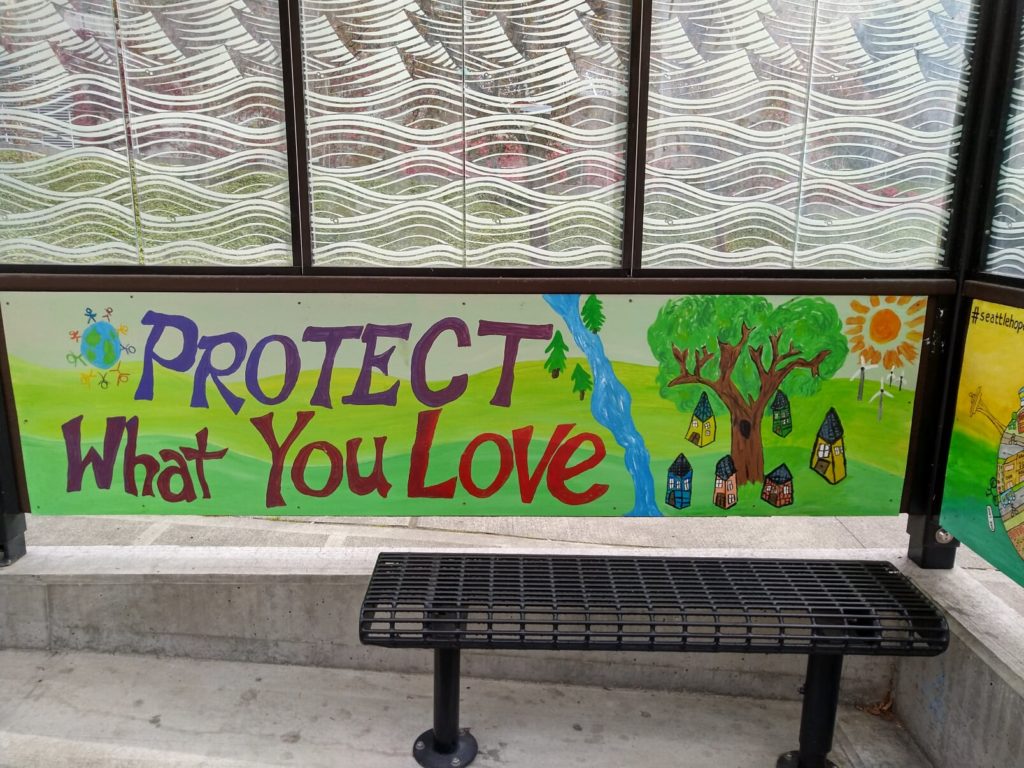I think a lot about our culture’s dysfunctional and abusive relationship to the land, and how that unhealthy relationship influences much of what is unhealthy about our society. Our relationship to place, which begins with our relationship to land, is foundational; it influences everything else we do, including how we get around.
I’m not referring to the exhaustively discussed connections between transportation and “land use” (though that term does provide some insight into our cultural context); I’m saying that that the way we think about and relate to land influences how we get around. And, how we get around influences the way we think about and relate to land.
Our culture does not see inherent value in land. We have been trained to relate to it as a means to some end: either extracting “resources” for profit, or dividing it into pieces (“real estate”) to be owned by individual human beings. Taking from and abusing land is in the DNA of this settler nation. In big and small ways, we live as though land exists to please or benefit us, but not as though we owe anything back—or as though there is a limit to its ability to support our taking.
(I wrote more about how settler colonialism influences our relationship to place here.)
Our lack of connection to land keeps us from seeing beyond what we can extract from a place. We want to get “there” as fast as we can, do or buy something, and then get to the next place. Cars support this way of being, so we focus our communities around them. We are surrounded by roads, driveways, parking lots, and strip malls. We rarely consider that there is land underneath all that concrete.
And, because we’ve built an environment that revolves around cars, we can’t imagine (or often even manage) our lives without them. We use them for every trip, of every distance and level of urgency. This means that we are always moving too fast to have experiences that connect us to the land. And we are always moving too fast to notice the harm we cause.
When your days are spent driving a two-ton steel cage from your garage to a six-lane road to a freeway to another garage, you don’t get to know a place. You don’t feel the changes in terrain. You don’t experience the seasons. You don’t notice all the non-human beings who share your surroundings.
We don’t know the land, so we continue to degrade it by driving. We feel less connected to that degraded land because we drive. We become desensitized to “roadkill” and traffic deaths and exhaust and streets slick with oil. And the more disconnected we feel from the land we’ve degraded, the emptier and more restless we feel. We want to go somewhere else, to “nature.” And to do that, we must drive.
But once we get there, to “nature,” we don’t know how to be with it. We only know how to consume. And before long, all of our driving to and consuming of does more damage—to the land, and to us.
So what can we do to reclaim our relationship to the land?
The work isn’t fast. We’re in a crisis, but there is no quick fix. There is no magic policy or set of policies that will get us there. This doesn’t mean we shouldn’t pursue meaningful policies that prioritize the health of humans and all living beings. It does mean that no policy will save us unless and until we transform.
Of course I understand that for many of our ancestors, participation in this extractive, disconnected culture wasn’t a choice. But all of us, to varying degrees, have been indoctrinated into this harmful way of being. And our work is to find our way out.
We must start by acknowledging the truth.
Acknowledging the truth means mustering the courage to look at the harm we cause, knowing that we won’t be able to eliminate the direct harm of our own actions and choices, nor reverse the massive, planetary harm perpetrated by the culture we participate in.
We must grieve what has been lost, including our own ancestral connections and cultural traditions. Then we must begin the slow work of reconnecting.
We must pay attention to what is in front of us.
Paying attention means noticing. How the air smells after it rains. What is growing in the garden on the corner. The intricate pattern of the spider web on the balcony.
Paying attention also means learning. The natural and human histories of the places we call home. Whose land we occupy. Where our drinking water comes from. What forces shaped the communities where we live.
We must change the narrative that has brought us to this crisis.
Changing the narrative means learning to see the land as living, as inherently worthy, as deserving of our attention and appreciation. It means removing ourselves from the center of the story, and remembering that, to a mountain, to the ocean, even to a tree, our lifespans are a blink. What gives us such a sense of importance? What gives us a right to determine the future for all species?
We must learn the meaning of enough.
When we stop reaching for more, we can appreciate the gifts we rarely take time to appreciate. Air and water and soil and sunlight. All of the beings and processes that make it possible for us to eat. Shelter. Laughter. Music.
When we stop reaching for more, we realize that what we really want is love, and a sense of connection to something bigger.
And then, when we have done the work, when we have faced the truth and slowed down and noticed and reframed and found gratitude and satisfaction, we will be ready for transformation.
And we will walk into a new world.

